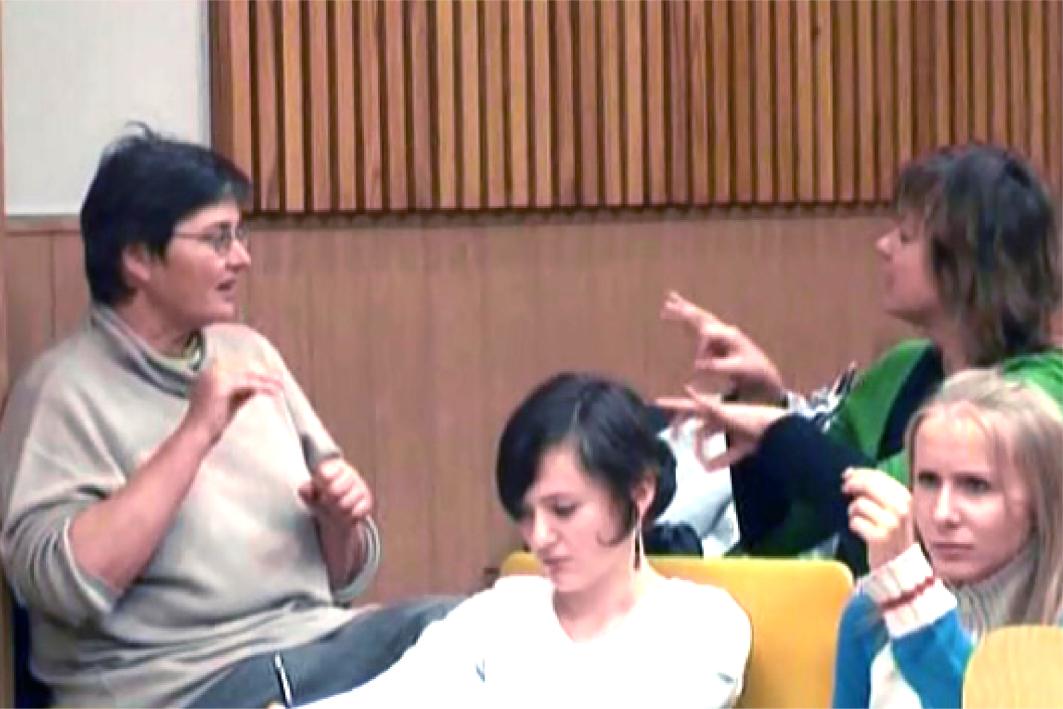PJM (Polish Sign Language) interpreters

PJM interpreters are dedicated to those who can’t hear at all or who has hearing impairment and cannot fully attend to classes.
To apply for translator support you should:
- Register at the Office for Persons with Disabilities by filling in and submitting a registration questionnaire
- Documentation (ie certificate of disability, audiogramme),
- Complete the request for a PJM interpreter and submit it to the OPD at the beginning of each semester.
Translation takes place in real time.
Detailed instructions about the student-lecturer-interpreter cooperation policies are provided below.
Student’s rights and obligations towards the interpreter
The student is obliged to:
- Respect the translator.
- Treat the techniques and strategies used by the translator as an expression of his professionalism.
- Make a dialogue with the translator – inform about student’s translation needs and any possible translation comments.
- Inform the translator about the place, time of translation and any organizational changes.
- Help the interpreter to arrange the best possible conditions for the translation (proper lighting of the room, appropriate place for the interpreter, setting the lecturer’s pace with the lecturer, working with a group of other students whose speech is translated during the class).
- Make available the contents of the lectures at least on the day preceding the translation.
- Inform the interpreter in advance about student’s possible absence.
- Notify the OPD of any serious issues preventing a student from working with the interpreter.
- Do not interfere in the translation, for example by asking additional questions not related to the content of the lectures / exercises, involving the translator in performing the tasks assigned by the lecturer (ie. text analysis).
The student has right to:
- Present the scope of his rights and to enforce the fulfillment by the interpreter of his duties.
- An organizational meeting (to discuss the rights and obligations of both sides in the presence of the OPD representative).
- Be respected by the translator.
- A reliable interpretation of his needs (SJM, PJM, appropriate manner and rate of articulation, literal or free translation).
- Determine the manner of translation (consecutive or simultaneous interpreting).
- Control the precision of the translation of his speech, ie. by reading speech from the mouth.
- The information about non-translated pieces of text, dependent or independent from the translator.
- Translation of conversations that are not related to the contents of the lecture, and take place during the lecture.
- Be as comfortable as possible in the reception of the translation (the appropriate color of the translator’s outfit – blurry colors, facial reveals, delicate makeup – for women).
- Resign of an interpreter if: he is often late or absent, is unsuccessful in translating (deliberate negligence), exceeds his her competence (ie. behaving inappropriately towards the lecturer).
- Secrecy, which means the translator does not pass on any detailed information about translation to other people.
- Discuss with the interpreter the translation that was made (provide the information needed for evaluation and to improve the quality of the translation).
- The exact translation of the views and thoughts conveyed by the lecturer (the translator does not omit the fragments incompatible with his own views).
- Receive support in a situation of discrimination, for example, a translator can help him or her to speak in the ongoing discussion (in case the deaf person is not allowed by the hearing person).
Rights and obligations of the translator towards the student
The interpreter has right to:
- Present the scope of rights related to the role of translator and to enforce the student to fulfill his responsibilities.
- An organizational meeting (to discuss the rights and obligations of both sides in the presence of the OPD representative).
- Be respected by the student.
- Use appropriate translation techniques and strategies such as “lag time”, paraphrases / explanations, generalizations, approximations, and others that improve the quality of the translation and is able to justify it.
- Determine the manner of translation (consecutive or simultaneous interpreting).
- receive the contents of the lectures at least on the day preceding the translation.
- Ask the student and the lecturer to help him to arrange the best possible conditions for the translation (proper lighting of the room, appropriate place for the interpreter, setting the lecturer’s and other students’ pace during classes).
- Do not remember the contents of the translated part of speech/text (Simultaneous translation is a multi-tasking operation, which makes it difficult or even impossible to take up another thought operation – further storing the already translated content).
- Have difficulties in tracking and analyzing simultaneously the content displayed during slide translation; Depending on the situation of the translation (the way of seating, the type of slides – the amount and degree of transparency of the content).
- Refuse to perform tasks beyond the scope of his duties (beyond the role of interpreter),ie. translations on a non-fixed or pre-negotiated basis, memorization and explanation of the translation.
- Care for a reliable translation, refuse to answer questions not related to the content of the translation and talks on about the side issues.
- Respond in a situation of discrimination against a deaf student, ie: helping him or her to speak in an ongoing discussion (in case the deaf person is not allowed by the hearing person).
- Notify the OPD about serious problems that prevent the cooperation andwhen the student expects support in solving them (ie. lack of materials, lack of cooperation from lecturers, from other hearing students, inappropriate behavior of a deaf student).
- Refuse the cooperation in a justified situation caused by a student’s behavior (ie in the absence of a respect).
The translator is obliged to:
- Check if the qualifications he/her has and the level of practical language skills are sufficient to complete the job.
- Use the principles of professional ethics.
- Describe the scope of responsibilities of the role of a translator.
- Customize the type of translation to the needs of the student (SJM, PJM, the right way and rate of articulation, others).
- Translate both the content provided by the lecturer and the other students participating in the lecture/exercises.
- Prepare to translation (read lecture’s content, develop vocabulary).
- Treat respectfully the student, the lecturer and other students participating in classes.
- Keep secrecy, which means he/she does not pass on any detailed information about translation to other people.
- Provide the student the highest comfort in receiving the translation (the appropriate color of the translator’s outfit – blurry colors, facial reveals, delicate makeup – for women).
- Ensure the best possible conditions for translation (proper lighting of the room, fixing the lecturer’s pace, establishing cooperation with a group of other students whose speech is translated during the class); The translator does this discreetly, without disturbing the course of the class.
- Avoid adopting a central position in translation (focusing attention) for the most natural communication of both sides of the translation.
- Discuss with the student the translation that was made (provide the information needed for assessing the quality of the translation).
- Honestly inform the student of the inability to perform certain tasks that go beyond the role of interpreter or due to difficulties with the situation of the translation (eg pronunciation errors of the speaker – one of the students or the position of the interpreter, which makes it impossible to follow the content of the slide).
- Perform reliably a translation (the equivalent transfer of content within the selected communication code – according to the grammar and culture of the language).
- Inform the student about non-translated pieces of text/speech, dependent or independent from the translator.
- To keep exact translation of the views and thoughts conveyed by the lecturer (not omit the fragments incompatible with translator’s own views).
- Be present at pre-determined dates of classes or lectures.
- Inform as soon as possible about the absence, and to ensure his/her replacement (personally or via the OPD), if possible.
- Be punctual (to come a few minutes before the translation begins to prepare the optimal conditions for its course).
- Notify the OPD about any serious problems which prevent the translator from cooperation with the student, and which causes the necessity of termination the contract.




